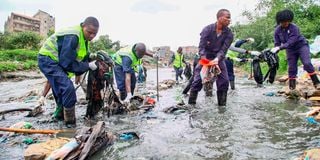Address the source of pollutants in water bodies

Members of Komb Green Solutions clean up a section of Nairobi River in Korogocho, Nairobi, on October 10, 2024.
What you need to know:
- Going directly into removal of solid waste from our water bodies can only be compared to mark timing.
- We should first look at the sources of solid waste, which are mostly homes, factories and industries.
Listening to the minister for Environment, Forestry and Climate Change, Mr Adan Duale, during Thursday’s tree-planting day, the very cardinal points he elaborately talked about were about the need and the urgency to address sources of the pollutants that end up in the rivers. The CS has a very strong point.
Our starting point as a country and counties especially Nairobi has been to directly removing the solids especially solid waste that has been dumped into the city rivers the worst hit being rivers Ngong and Nairobi and others that drain directly into River Nairobi.
The activity of the team that the government has brought on board to clean up the rivers in the city and thereby creating job opportunities is the wrong approach.
Going directly into removal of solid waste from our water bodies can only be compared to mark timing where you march on the spot without moving forward.
We should first look at the sources of solid waste, which are mostly homes, factories and industries. Proper solid waste management, especially garbage collection, will go a long way in ensuring the rivers are protected. Most counties have contracted private waste collectors. The Nairobi City County has also licensed various waste companies who directly charge waste producers and pay operating licenses.
Clean water sources
This is spreading to other counties as well. Though this is cheap and progressive in the long run for the counties because solid waste management is a very expensive venture and collection of it to a 100 per cent level by the counties using their own labour is not possible, what has not been very effective is enforcement that will ensure waste reaches the designated final disposal points.
Most collectors have been accused of dumping the waste directly into rivers. People living along river banks mostly in the slums have for years thrown their waste into the water bodies.
Enforcement and compliance is the key to have clean water sources. Counties should also revisit their sewerage systems and find out whether they are effective.
Some counties are using old sewerage systems that are no match for the ever-growing populations moving daily into urban areas.
Ensuring waste is collected at source and properly disposed of will offer the very lasting solution to pollution menace.
Industries and factories that have space should also be encouraged to have” wetlands” where their waste water discharges will be pass through before being discharged to the outside world. Prevention of the dumping of waste in water bodies should be the starting point.
Mr Kigo is a retired environment officer. [email protected]





